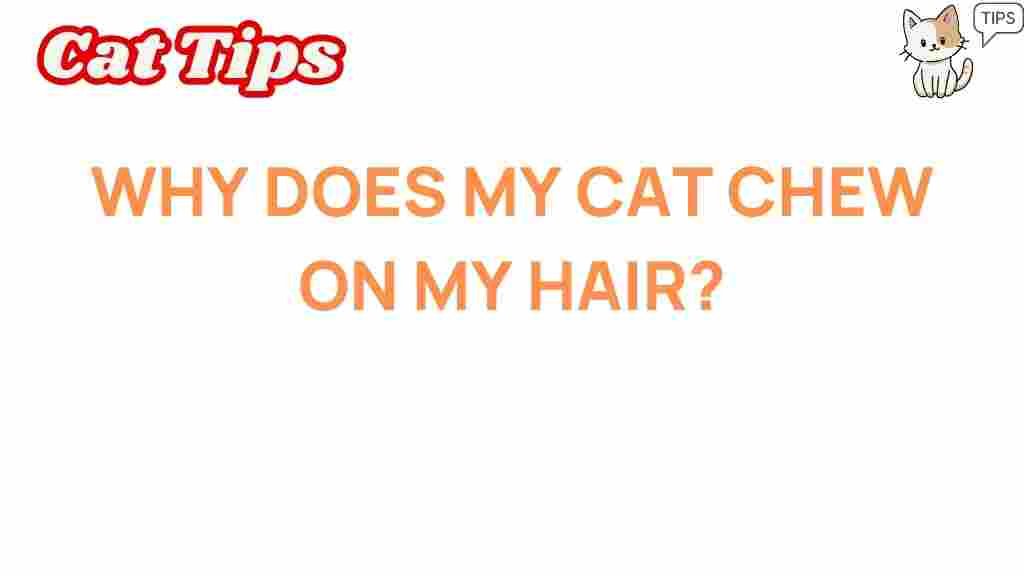Understanding Cat Behavior: Why Does My Cat Chew on My Hair?
If you’re a cat owner, you may have experienced the peculiar habit of your feline friend chewing on your hair. This behavior might seem bizarre, but it’s not uncommon among cats. Understanding the underlying reasons for this conduct can help you foster a better relationship with your pet and address any concerns you might have. In this article, we will unravel the mystery behind this curious cat behavior, explore the reasons behind it, and provide tips on how to manage it effectively.
The Psychology Behind Cat Behavior
Cats are fascinating creatures with complex behavioral patterns. Understanding these patterns is essential for any cat owner. Here are some key aspects of cat behavior that can help explain why your cat might chew on your hair:
- Affection and Bonding: Cats often use grooming as a way to bond with their owners. Chewing on hair may mimic this grooming behavior, showcasing their affection.
- Stress Relief: Chewing can be a soothing activity for cats. If your cat is feeling anxious or stressed, they might resort to chewing on your hair as a self-soothing mechanism.
- Playfulness: Cats are naturally playful. When they chew on your hair, it might simply be their way of engaging in play, especially if they are feeling energetic.
- Curiosity: Cats are known for their inquisitive nature. The texture and smell of human hair can attract their attention and encourage them to investigate further by chewing.
Common Reasons Cats Chew on Hair
Let’s dive deeper into the specific reasons why your cat might be engaging in this particular behavior:
1. Grooming Behavior
Cats groom themselves to maintain their coat and to relax. When they chew on your hair, it could be an extension of this grooming behavior. They may see you as part of their family unit and feel compelled to groom you as a sign of love and acceptance.
2. Seeking Comfort
In stressful situations, cats often seek comfort in familiar scents and textures. Your hair holds your unique scent, which can provide a sense of security for your cat. Chewing on your hair may be a way for them to cope with anxiety.
3. Playful Behavior
Some cats engage in hair chewing as a form of play. If your cat is particularly active and playful, they may see your hair as a toy and enjoy the interaction it provides. This is especially common in younger cats or kittens.
4. Attention-Seeking
Cats are clever animals and often learn how to get our attention. If you react when your cat chews on your hair—whether positively or negatively—your cat may repeat this behavior to elicit a response. This reinforces the behavior as a means of gaining your attention.
Step-by-Step: Managing Hair Chewing Behavior
If your cat’s hair chewing has become excessive or bothersome, here are some steps you can take to manage the behavior:
Step 1: Assess the Environment
Take a moment to evaluate your cat’s environment. Is there anything that may be causing stress? Changes in the household, such as new pets or moving to a new home, can upset your cat. Create a calm environment to help alleviate anxiety.
Step 2: Provide Alternatives
Offer your cat alternative forms of engagement. Toys that mimic prey or scratching posts can redirect their energy away from your hair. Interactive play sessions can also help burn off excess energy and deter them from chewing on your hair.
Step 3: Use Deterrents
If your cat continues to chew on your hair, consider using safe deterrents. Spraying your hair with a bitter-tasting solution can make it less appealing to your cat. Ensure that any deterrents used are pet-safe and non-toxic.
Step 4: Encourage Positive Behavior
Whenever your cat plays with their toys or engages in positive behavior, reward them with treats or affection. This will reinforce good behavior and help them understand that there are better ways to seek your attention.
Step 5: Consult a Veterinarian
If the hair chewing persists or is accompanied by other concerning behaviors, it may be time to consult a veterinarian. They can rule out any underlying health issues that may be contributing to your cat’s anxiety or compulsive behaviors.
Troubleshooting Common Issues
While managing your cat’s hair chewing behavior, you may encounter some challenges. Here are common issues and how to address them:
1. Excessive Hair Chewing
If your cat is excessively chewing on your hair, it might be a sign of a deeper issue. Monitor their behavior closely, and if it becomes compulsive, consult with a veterinarian or an animal behaviorist.
2. Ignoring Alternatives
If your cat shows no interest in toys or alternative distractions, try changing the type of toys you offer. Some cats prefer interactive toys, while others may enjoy soft plush toys. Experiment with different options to find what resonates with your cat.
3. Stress Triggers
Pay attention to what might be causing stress for your cat. Sudden changes in routine, loud noises, or new pets can all create anxiety. Take steps to minimize these triggers and observe if your cat’s behavior improves.
Conclusion: Understanding and Addressing Cat Behavior
Understanding why your cat chews on your hair is key to managing this behavior effectively. Whether it’s a sign of affection, stress relief, or playfulness, recognizing the underlying factors can help you foster a healthier relationship with your feline companion. Remember, every cat is unique, and their behavior can vary widely. By implementing the strategies and tips mentioned above, you can redirect this behavior and ensure your cat remains happy and healthy.
For more insights into cat behavior and care, check out our article on understanding feline body language. For professional advice, consider visiting a local veterinarian or a certified animal behaviorist.
By investing time in understanding your cat’s behavior, you create a more harmonious living environment that benefits both you and your beloved pet.
This article is in the category Behavior and created by CatTips Team
